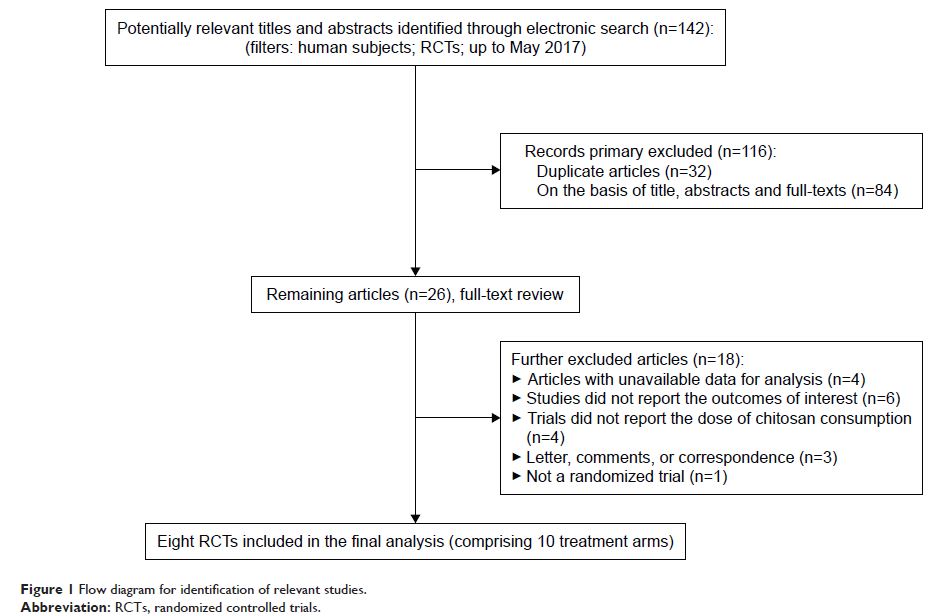108985
论文已发表
注册即可获取德孚的最新动态
IF 收录期刊
- 3.4 Breast Cancer (Dove Med Press)
- 3.2 Clin Epidemiol
- 2.6 Cancer Manag Res
- 2.9 Infect Drug Resist
- 3.7 Clin Interv Aging
- 5.1 Drug Des Dev Ther
- 3.1 Int J Chronic Obstr
- 6.6 Int J Nanomed
- 2.6 Int J Women's Health
- 2.9 Neuropsych Dis Treat
- 2.8 OncoTargets Ther
- 2.0 Patient Prefer Adher
- 2.2 Ther Clin Risk Manag
- 2.5 J Pain Res
- 3.0 Diabet Metab Synd Ob
- 3.2 Psychol Res Behav Ma
- 3.4 Nat Sci Sleep
- 1.8 Pharmgenomics Pers Med
- 2.0 Risk Manag Healthc Policy
- 4.1 J Inflamm Res
- 2.0 Int J Gen Med
- 3.4 J Hepatocell Carcinoma
- 3.0 J Asthma Allergy
- 2.2 Clin Cosmet Investig Dermatol
- 2.4 J Multidiscip Healthc

壳聚糖干预对血压控制影响的定量评估
Authors Huang H, Zou Y, Chi H
Received 2 August 2017
Accepted for publication 30 October 2017
Published 28 December 2017 Volume 2018:12 Pages 67—75
DOI https://doi.org/10.2147/DDDT.S148064
Checked for plagiarism Yes
Review by Single-blind
Peer reviewers approved by Dr Amy Norman
Peer reviewer comments 5
Editor who approved publication: Dr Tuo Deng
Background: Chitosan is a popular dietary fiber often used to reduce dietary
fat absorption to control weight and blood lipids. However, its effects on
blood pressure (BP) have not been fully elucidated. We evaluated the effects of
chitosan administration on systolic blood pressure (SBP) and diastolic blood
pressure (DBP) through a pooled analysis of available randomized controlled
trials (RCTs).
Materials and methods: Electronic searches were conducted in Medline,
Cochrane Library, Scopus, and EMBASE to identify relevant human placebo-control
RCTs. Trials that reported BP changes from baseline to study endpoint in patients
receiving treatment of chitosan were included for analysis. Weighted mean
difference (WMD) and 95% CIs were pooled using fixed-effects or random-effects
models. Statistical heterogeneity, prespecified subgroup, publication bias,
sensitivity analysis, and meta-regression assessments were also tested.
Results: Six hundred and seventeen participants from
eight trials with 10 arms were included. Overall, chitosan administration did
not significantly lower SBP (WMD: -1.41 mmHg, 95% CI: -3.29 to 0.47; P =0.14) and DBP (WMD: -0.61 mmHg,
95% CI: -1.75 to 0.52; P =0.29). However,
our subgroup analyses indicated that chitosan consumption significantly reduced
DBP in shorter-term (<12 weeks) and higher-dose (>2.4 g/day) arms. Funnel
plots or Egger’s tests analysis (P =0.36 and 0.43 for
SBP and DBP, respectively) demonstrated that there was no significant
publication bias in this study.
Conclusion: This
meta-analysis indicates that chitosan consumption significantly decreases DBP
at higher dosage and in shorter-term interventions, while chitosan has no
significant effects on SBP. However, these results should be interpreted
cautiously because of the limited eligible RCTs included in this meta-analysis;
further large-scale, well-designed RCTs on this topic are urgently needed.
Keywords: chitosan,
hypertension, blood pressure, meta-analysis
